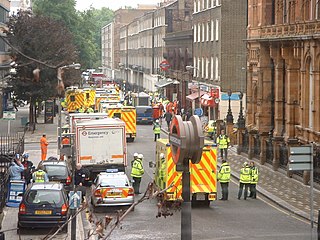
The 7 July 2005 London bombings, also referred to as 7/7, were a series of four coordinated suicide attacks carried out by Islamist terrorists that targeted commuters travelling on London's public transport during the morning rush hour.

The following is a timeline of the 7 July 2005 London bombings and 21 July 2005 London bombings.
On Thursday, 21 July 2005, four attempted bomb attacks by Islamist extremists disrupted part of London's public transport system as a follow-up attack from the 7 July 2005 London bombings that occurred two weeks earlier. The explosions occurred around midday at Shepherd's Bush, Warren Street and Oval stations on the London Underground, and on London Buses route 26 in Haggerston on Hackney Road. A fifth bomber dumped his device without attempting to set it off.

The 2005 Delhi bombings occurred on 29 October 2005 in Delhi, India, killing 62 people and injuring at least 210 others in three explosions. The bombings came only two days before the important festival of Diwali, which is celebrated by Hindus, Sikhs, and Jains. The bombs were triggered in two markets in central and south Delhi and in a bus south of the city. The Pakistani Islamist terrorist group Lashkar-e-Taiba claimed responsibility for the attacks under the pseudonym of Islamic Inquilab Mahaz. The Indian Mujahideen is also suspected of involvement.

The 2005 Amman bombings were a series of coordinated suicide bomb attacks on three hotel lobbies in Amman, Jordan, on 9 November 2005. The explosions at the Grand Hyatt Hotel, the Radisson SAS Hotel, and the Days Inn started at around 20:50 local time at the Grand Hyatt. The three hotels are frequented by foreign diplomats. The bomb at the Radisson SAS exploded in the Philadelphia Ballroom, where a Palestinian wedding hosting hundreds of guests was taking place. The attacks killed 57 people and injured 115 others.
The 2001 BBC bombing was a terrorist attack on the BBC's main news centre within BBC Television Centre, on Wood Lane in the White City area of West London.
Terrorism in Uganda primarily occurs in the north, where the Lord's Resistance Army, a militant Christian religious cult that seeks to overthrow the Ugandan government, has attacked villages and forcibly conscripted children into the organization since 1988. The al-Shabbab jihadist group has also staged attacks in the country.

The Glasgow Airport attack was a terrorist ramming attack which occurred on 30 June 2007, at 15:11 BST, when a dark green Jeep Cherokee loaded with propane canisters was driven at the glass doors of the Glasgow Airport terminal and set ablaze. The car's driver was severely burnt in the ensuing fire, and five members of the public were injured, none seriously. Some injuries were sustained by those assisting the police in detaining the occupants. A close link was quickly established to the 2007 London car bombs the previous day.

The Exeter bombing was a failed bombing attempt that took place on 22 May 2008, at the Giraffe cafe and restaurant in Princesshay, Exeter, England. The bomber, Nicky Reilly, 22, from Plymouth, who was the only person injured, pleaded guilty on 15 October 2008 to launching the attempted suicide attack.

This is a list of terrorist incidents in Iraq during 2010. Major attacks include a 1 February attack killing 54 in Baghdad, and a 10 May attack killed 45 at a fabrics factory in Hillah.
These are the list of Terrorist attacks in Pakistan in 2010.

The 2012 Bangkok bombings were a series of explosions that occurred in Bangkok, Thailand on 14 February 2012, injuring five people. Thai authorities said that the bombings were a botched attempt by Iranian nationals to assassinate Israeli diplomats. Several Iranians were arrested and charged for the attacks, one of whom was badly injured.

On 17 August 2015, a bombing took place inside the Erawan Shrine at the Ratchaprasong intersection in Pathum Wan District, Bangkok, Thailand, killing 20 people and injuring 125. Thai police were reported to have arrested two suspects, the second of whom confessed to having been the bomber. He later retracted his confession.

On 24 July 2016, fifteen people were injured, four seriously, in a suicide bombing outside a wine bar in Ansbach, Bavaria, Germany. The bomber, identified by police as Mohammad Daleel, was a 27-year-old Syrian asylum seeker who had pledged allegiance to Abu Bakr al-Baghdadi, leader of the Islamic State. He was the only fatality in the incident. According to German authorities, Daleel was in contact with the Islamic State and had been planning more attacks before his backpack bomb exploded accidentally.

On 15 September 2017, at around 08:20 BST, an explosion occurred on a District line train at Parsons Green Underground station, in London, England. Thirty people were treated in hospital or an urgent care centre, mostly for burn injuries, by a botched, crude "bucket bomb" with a timer containing the explosive chemical TATP. Police arrested the main suspect, 18-year-old Iraqi asylum seeker Ahmed Hassan, in a departure area of the Port of Dover the next day, and subsequently raided several addresses, including the foster home of an elderly couple in Sunbury-on-Thames where Hassan lived following his arrival in the United Kingdom two years earlier claiming to be an asylum seeker.

The 2012 Istanbul suicide bombing occurred at a police station in the Sultangazi district of Istanbul, Turkey. The suicide bomber was İbrahim Çuhadar, a member of the Revolutionary People's Liberation Party/Front (DHKP-C). On 11 September 2012, he went to the police station and attempted to enter, then detonated the explosives at the entrance of the station after the police refused him entrance. As a result of the explosion, the attacker and a police officer died and seven others were injured.
From late October to mid November 2021, the Allied Democratic Forces (ADF) and the Islamic State organization carried out four bombing attacks across Uganda.













